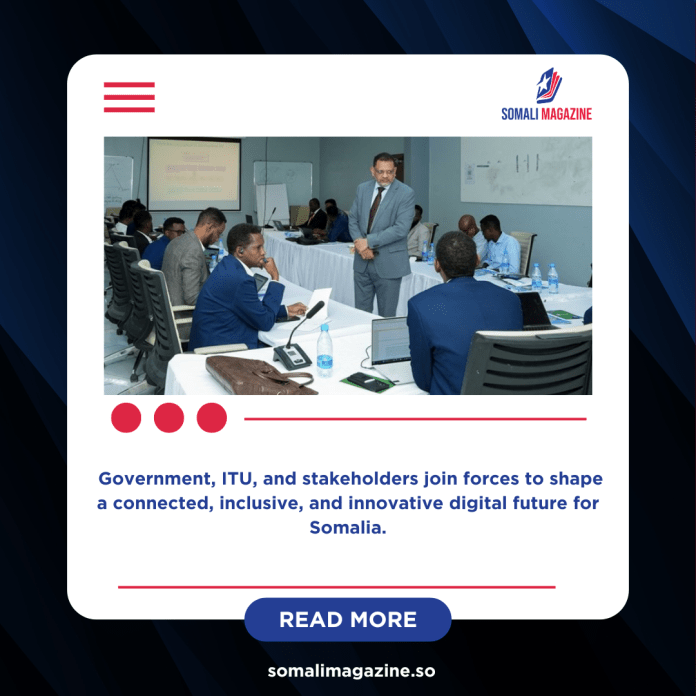Facebook Twitter (X) Instagram Somali Magazine - People's Magazine
Somalia has taken another major step toward embracing the digital era with the launch of a two-day National Multi-Stakeholder Consultation Workshop aimed at validating the country’s Digital Transformation Strategy (2025–2030). The event, held in collaboration between the National Communications Authority (NCA), the Ministry of Communications and Technology (MoCT), and the International Telecommunication Union (ITU), gathered representatives from key government institutions, regulatory bodies, and licensed telecom operators. The goal is to refine and finalize a roadmap that will guide Somalia’s journey toward a modern, inclusive, and innovative digital economy.
Speaking during the opening session, Mustafa Almahdi, Program Officer at the ITU Arab Regional Office, reaffirmed the organization’s full support for Somalia’s digital ambitions. He emphasized that collaboration among national and international stakeholders is essential for advancing development through technology. Almahdi also highlighted that digital transformation goes beyond connectivity—it strengthens governance, improves access to services, and drives sustainable growth.
The Director General of the NCA, Mustafa Yasin Sheikh, described the Digital Transformation Strategy as a defining milestone in Somalia’s ongoing digital journey. He noted that the plan demonstrates the country’s determination to create a resilient and inclusive digital ecosystem that benefits both citizens and businesses. According to him, the strategy’s success will depend heavily on strong partnerships between the government, private sector, and development partners. These collaborations, he said, will ensure that Somalia’s digital growth is sustainable, well-coordinated, and aligned with global standards.
Minister of Communications and Technology, Mohamed Adan Moallim Ali, said the new strategy will serve as a national framework that guides all ICT-related programs and policies across different sectors. He underlined the government’s dedication to improving coordination among agencies, investing in digital infrastructure, and building the technical skills of citizens to support a thriving knowledge-based economy. The Minister emphasized that the digital strategy is not only about technology but also about creating opportunities, improving service delivery, and boosting economic growth through innovation.
During the workshop, participants are engaging in in-depth discussions on key elements of the strategy, including Somalia’s digital vision, its main strategic pillars, and a detailed implementation roadmap. The discussions also focus on governance structures, funding mechanisms, and how the strategy aligns with regional frameworks such as those of the African Union (AU) and the East African Community (EAC). These alignments are crucial in ensuring that Somalia’s digital transformation is consistent with broader continental and regional digital agendas.
The Digital Transformation Strategy (2025–2030) represents a bold and forward-looking commitment by Somalia to harness the power of technology for national development. It seeks to address challenges such as limited digital access, infrastructure gaps, and low digital literacy, while opening up new opportunities for entrepreneurship, innovation, and economic inclusion. By establishing clear goals and frameworks, the strategy aims to enhance connectivity, improve public service delivery, and make Somalia more competitive in the regional digital landscape.
As the country continues to recover from decades of instability, the government and its partners view digital transformation as a vital tool for rebuilding institutions and creating new pathways for progress. The successful implementation of this strategy could mark a turning point for Somalia—shifting it from a developing digital environment to a fully connected nation that leverages technology to empower its citizens and strengthen its economy.

